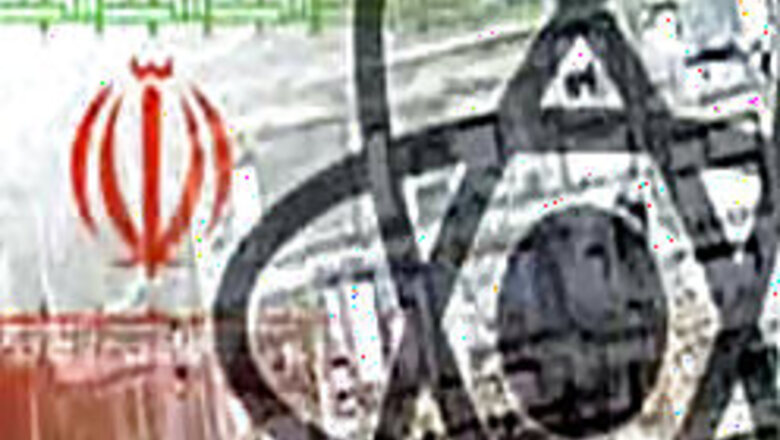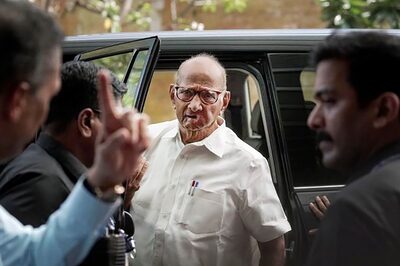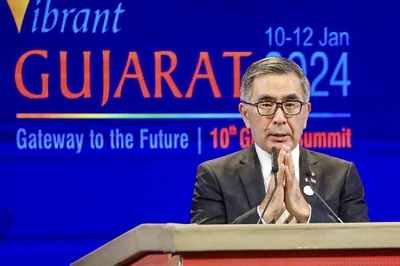
views
New Delhi: Iran has defied the UN Security Council's deadline of August 31 to halt atomic fuel work. As a result, US and European officials are likely to push for low level sanctions like travel bans and ban on sale of dual-use technology to Tehran.
The hope is to start with relatively low-level punishments in a bid to attract Russian and Chinese support, the officials have signaled.
Meanwhile, Tehran is confident of reaching a negotiated settlement over its nuclear programme. Foreign Ministry spokesman Hamid Reza Asefi shrugged off the possibility of sanctions, telling state-run television that Iran "will find a way to avoid pressure eventually".
But Iran also says, if it comes to sanctions, it can take anything the UN Security Council might impose for its expected failure to meet Thursday's deadline to halt sensitive nuclear work.
President Mahmoud Ahmadinejad did not directly address the deadline but maintained Iran's right to nuclear technology in a speech to a cheering crowd of thousands in Orumiyeh in northwestern Iran.
"The Iranian nation will not succumb to bullying, invasion and the violation of its rights," Ahmadinejad said.
But economists say restrictions on financing from European banks would hike borrowing costs for Iranians and make it tougher to import equipment. For now, Iran's coffers are brimming with petrodollars, so the central bank is able to help businesses, which need hard currency for trade.
Washington also continues to hold open the possibility that it and allies — as the next step — might pursue a course outside the UN Security Council and impose penalties of their own against Iran.
Iran could theoretically still announce a full stop to uranium enrichment before a late Thursday deadline to do so, set by the Security Council. But that appeared unlikely, given Ahmadinejad's speech and new findings by the International Atomic Energy Agency that Iran was enriching small quantities of uranium as late as Tuesday.
In a speech devoted mostly to local issues, Ahmadinejad said enemies of the country were trying to stir up differences among the Iranian people, but "I tell them: you are wrong. The Iranian nation is united."
"They claim to be supporting freedom but they support the most tyrannical governments in the world to pursue their own interests," he said, referring to the United States.
"They talk about human rights while maintaining the most notorious prisons," he said. "Those powers that do not abide by God and follow evil are the main source of all the current problems of mankind."
Iran's refusal to heed the Security Council demand to stop enrichment will be detailed in a confidential IAEA report to be completed Thursday and given to the Security Council. That is likely to trigger council members — by mid-September — to begin considering economic or political sanctions.
The US State Department has not said publicly what it might seek. But US and European officials have indicated they might push for travel restrictions on Iranian officials or a ban on sale of dual-use technology to Iran.
The hope is to start with relatively low-level punishments in a bid to attract Russian and Chinese support, the officials have signaled.
More extreme would be a freeze on Iranian assets or a broader trade ban — although opposition to that by Russia, China and perhaps others would be strong, particularly since it could cut off badly needed oil exports from Iran.
Russia and China seem likely, in any case, to resist US-led efforts for a quick response, which likely means sanctions do not loom immediately.
That has prompted the Bush administration to consider rallying allies to impose sanctions or financial restrictions of their own, independent of the Security Council.
PAGE_BREAK
Tehran insists it wants to enrich uranium as fuel solely for civilian nuclear power stations. However, the US and other Western countries suspect it wants to use it in nuclear warheads.
On Wednesday, Ahmadinejad urged European members of the council against resorting to sanctions, saying punishment would not dissuade his country. Another top Iranian official was in Japan on Thursday urging it, as an influential nation in Asia, to help peacefully resolve the standoff without sanctions.
Abbas Araghchi, deputy minister for legal and international affairs of the Iranian Foreign Ministry, met with Japan's foreign minister in a clear sign of Iran's continued efforts to lobby countries worldwide against support for sanctions.
"We are confident of the peaceful nature of our program. So if there is also goodwill and sincerity in the other side, we are sure that we can reach a good solution, a good conclusion through negotiations," Araghchi said.
Iran pursued a clandestine nuclear program for 18 years until it was uncovered by the UN nuclear watchdog agency in 2003.
German Foreign Minister Frank-Walter Steinmeier expressed fresh suspicion that Iran is pursuing nuclear weapons and said in remarks published Thursday that Arab governments are equally worried about Tehran's ambitions.
"At the moment, Iran has no use whatsoever for enriched uranium — unless it is planning to build the bomb," Steinmeier was quoted as saying in the newspaper Bild.
The United States, Russia, China, Britain, France and Germany offered Iran earlier this summer a package of incentives in exchange for a commitment from Tehran to freeze enrichment so talks could begin.
But Tehran's response earlier this month made clear the country was not willing to suspend enrichment before talks, let alone consider a long-term moratorium on such activity.
The West has struggled for years over carrots and sticks to persuade Iran to roll back its nuclear program. But Tehran has time after time played the game by its rules and kept its eyes constantly on a long-term prize: forcing the world to accept its nuclear ambitions.
Iranian leaders have made clear they're willing to bear the economic blow of whatever sanctions are passed rather than give up enrichment.
That means Thursday will hardly be a climactic milestone in the long-standing tussle between Iran and the West. Iran can go on putting forward diplomatic initiatives to try to divide the big powers and keep room for maneuver, said one analyst, Anthony Cordesman of the Center for Strategic and International Studies in Washington.
"This deadline will invariably be followed by another deadline and another," he said. "This is a game that will play out over five years, not a game that will play out tomorrow."




















Comments
0 comment